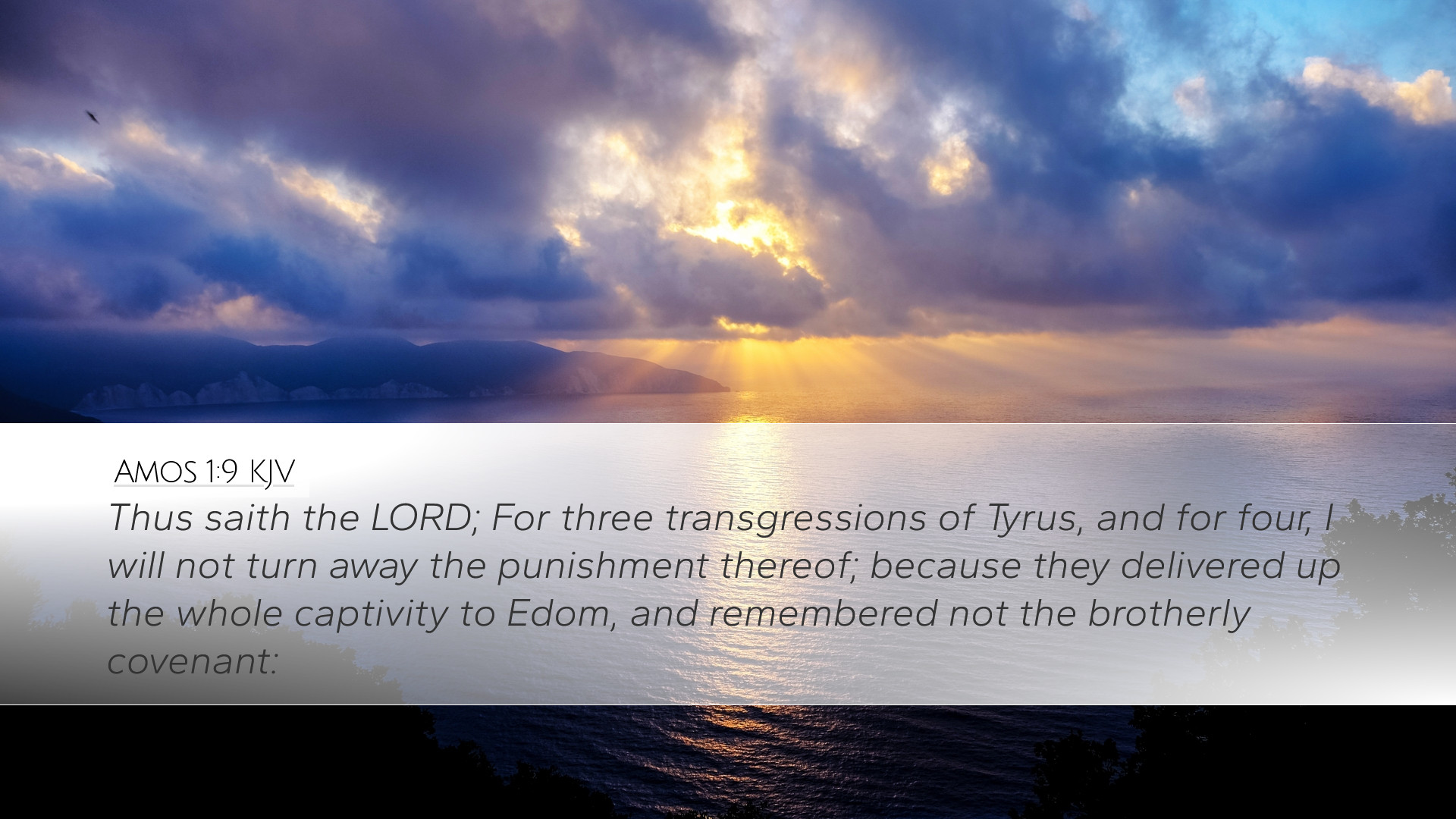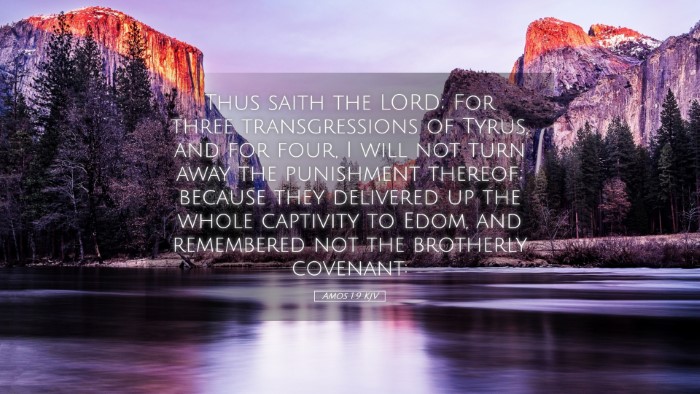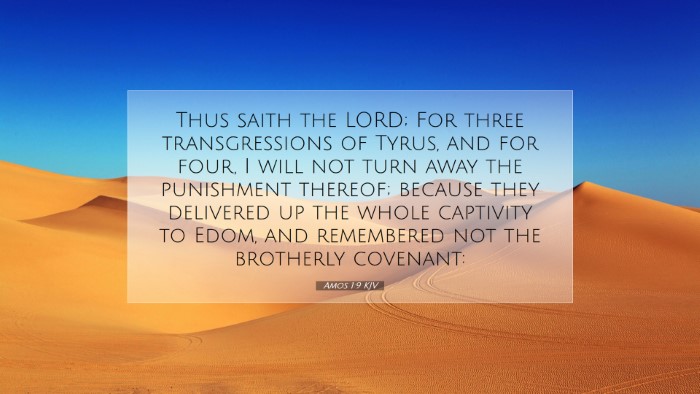Old Testament
Genesis Exodus Leviticus Numbers Deuteronomy Joshua Judges Ruth 1 Samuel 2 Samuel 1 Kings 2 Kings 1 Chronicles 2 Chronicles Ezra Nehemiah Esther Job Psalms Proverbs Ecclesiastes Song of Solomon Isaiah Jeremiah Lamentations Ezekiel Daniel Hosea Joel Amos Obadiah Jonah Micah Nahum Habakkuk Zephaniah Haggai Zechariah MalachiAmos 1:9
Amos 1:9 KJV
Thus saith the LORD; For three transgressions of Tyrus, and for four, I will not turn away the punishment thereof; because they delivered up the whole captivity to Edom, and remembered not the brotherly covenant:
Amos 1:9 Bible Commentary
Amos 1:9 Commentary
Verse Context: Amos 1:9 states, "Thus says the Lord: For three transgressions of Tyre, and for four, I will not revoke the punishment; because they delivered up a whole people to Edom, and did not remember the covenant of brotherhood." This verse is located within a passage where God pronounces judgment on various nations surrounding Israel, highlighting their sins and ultimate consequences.
General Overview
The Book of Amos is a critical prophetic text emphasizing social justice and accountability among nations. Amos, a shepherd and sycamore farmer from Tekoa, delivers God's messages primarily concerning Israel's moral decay and impending judgment, yet he also addresses neighboring nations, including Tyre.
Commentary Insights
Matthew Henry:
Henry emphasizes the moral and ethical implications of Tyre's actions, particularly their betrayal of fellow nations. He notes that Tyre, a powerful Phoenician city-state, engaged in treachery by selling Israelites into slavery, which violated the covenant of brotherhood. This breach is significant as it highlights the expectation God holds for nations to honor their agreements, especially those grounded in familial or friendly ties.
Albert Barnes:
Barnes focuses on the idea of divine justice in the verse. He illustrates how the Lord's pronouncement of judgment upon Tyre reflects God's righteousness in administering justice for their actions. The phrase "for three transgressions and for four" denotes a cumulative effect of sin that reaches a tipping point, thereby justifying God's impending punishment. He emphasizes that Tyre's mercenary mindset led to severe repercussions, as God does not overlook injustices, even in the case of mighty nations.
Adam Clarke:
Clarke offers a nuanced view of the historical context surrounding Tyre's judgments. He mentions that Tyre’s commerce had made them wealthy and influential, yet this prosperity came at the cost of moral integrity. Clarke points out that the phrase "covenant of brotherhood" recalls historical alliances and treaties among nations, which Tyre violated by selling fellow humans without regard for kinship or ethical obligations. This betrayal of trust is key to understanding the divine response ordained by God.
Theological Implications
This passage is not just a historical account but presents several theological principles that are relevant for contemporary readers, including:
- Covenant Accountability: The text illustrates God's expectation for nations (and individuals) to adhere to the moral weight of covenants made, symbolizing God's character as one who values truth and fidelity.
- Justice of God: It emphasizes the theme of divine justice — that God is aware of injustices and will act accordingly. This is particularly relevant for ministers and theologians discussing God's mercy balanced with His justice.
- The Nature of Sin: The reference to "three transgressions and for four" sheds light on the nature of sin; it demonstrates that recurring patterns of sin can lead to inevitable judgment. This theme encourages believers to reflect on the seriousness of sin in their lives and communities.
Practical Applications
For pastors, students, and theologians, Amos 1:9 serves as a profound reminder of the following applications:
- Advocacy for Justice: The call for justice resonates strongly in today's context. The church is urged to champion the cause of the oppressed and hold those in power accountable for their actions.
- Faithfulness in Relationships: The covenant of brotherhood serves as a model for how believers should treat one another and honor commitments, reflecting God's faithfulness in their daily relationships.
- Sensitivity to Sin: Recognition of the accumulation of sin leading to judgment invites self-examination—the church should encourage its members to seek holiness and discernment in their choices.
Conclusion
Amos 1:9 is rich in theological significance and moral implications. The insights extracted from various public domain commentaries underline the divine call to justice, accountability, and covenant faithfulness. As leaders and learners of the Word, reflection on this passage can inspire transformative action in personal lives and broader communities, aligning with God's desire for righteousness and fidelity in all relationships.


